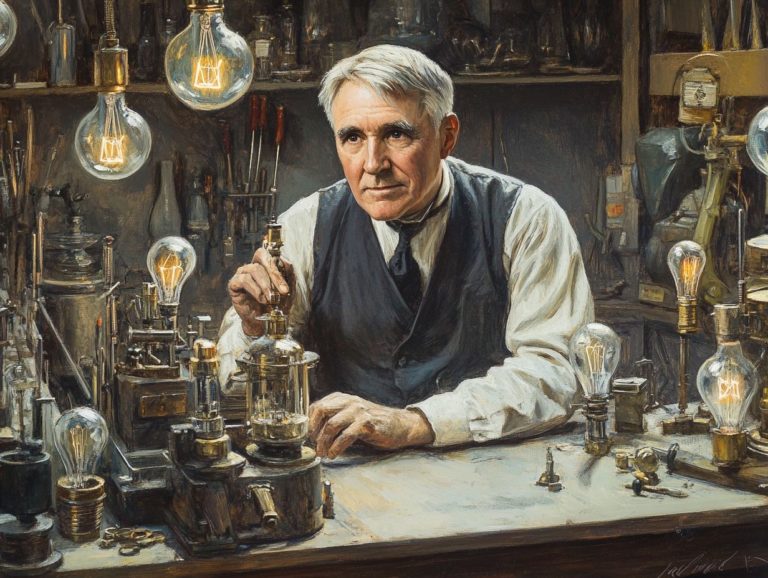From Tragedy to Triumph: The Story of Beethoven
Ludwig van Beethoven’s journey unfolds as a compelling narrative of resilience, creativity, and a lasting impact on music.
From his early years, where his innate talent blossomed through hard work, to the personal challenges he faced, including the heart-wrenching loss of his hearing, Beethoven’s life is a remarkable blend of struggle and triumph.
This exploration delves into his musical evolution, highlighting his transition to Romanticism and the enduring legacy that continues to inspire across generations.
Join us to uncover the extraordinary story of a true musical genius.
Contents
- Key Takeaways:
- Early Life and Musical Talent
- Personal Struggles and Setbacks
- Beethoven’s Musical Evolution
- Legacy and Influence
- Frequently Asked Questions
- What tragedy did Beethoven face in his early life?
- What inspired Beethoven to continue composing despite his hearing loss?
- How did Beethoven’s music evolve throughout his lifetime?
- What is the significance of Beethoven’s Ninth Symphony?
- What impact did Beethoven have on the world of music?
- How did Beethoven’s personal struggles contribute to his musical genius?
Key Takeaways:
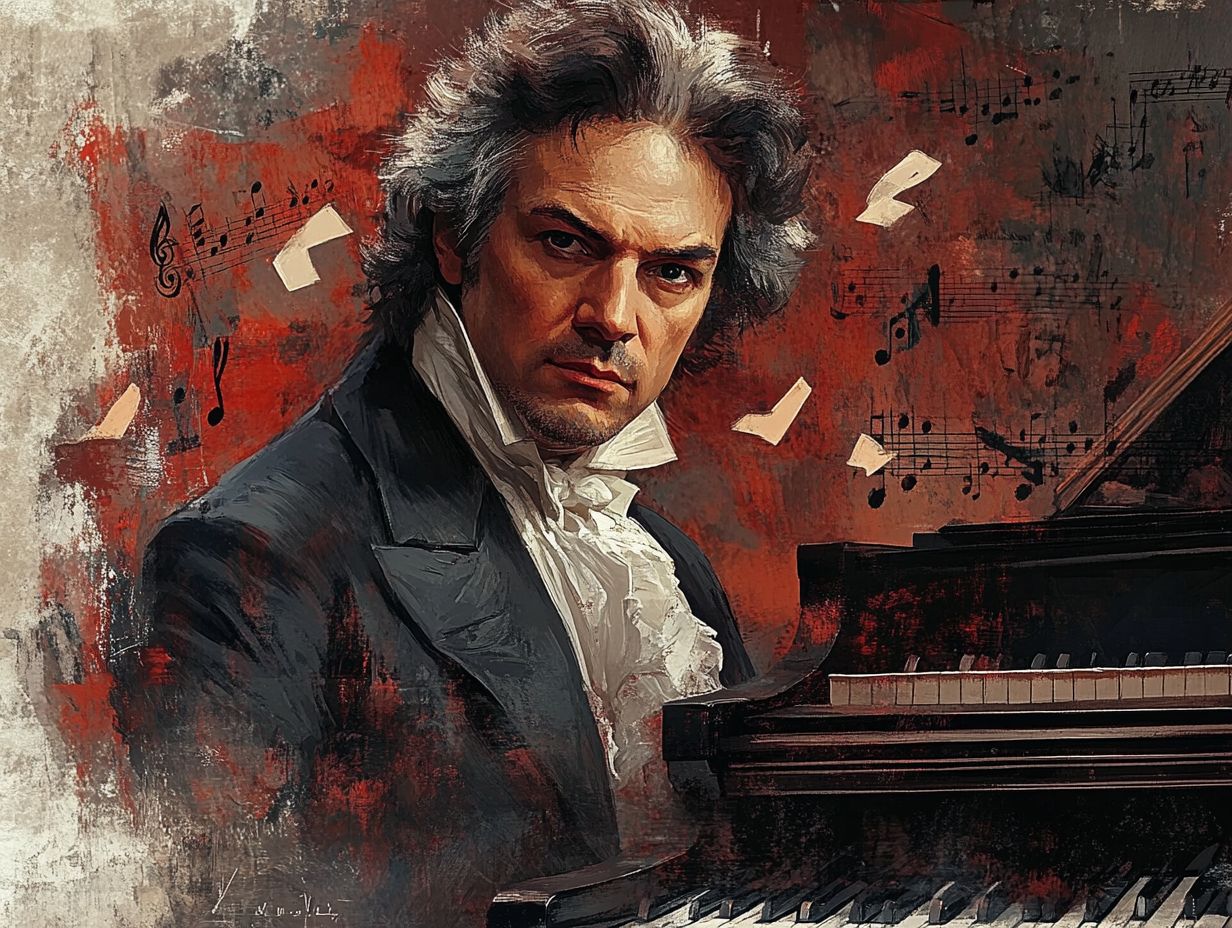
- Beethoven’s early success and recognition laid the groundwork for his musical career, despite personal struggles.
- His evolution as a composer, marked by his transition to Romanticism, solidified his legacy and influenced future generations.
- Beethoven’s journey from tragedy to triumph highlights music’s power and the human spirit’s ability to overcome challenges.
Early Life and Musical Talent
The early life of Ludwig van Beethoven illustrates how personal adversities can shape artistic expression. He navigated the complexities of his time, facing challenges that influenced his creative spirit.
These formative experiences laid the foundation for his remarkable musical talent, showcasing resilience in a world filled with adversity and cultural upheaval.
Childhood and Early Musical Education
Beethoven’s childhood was a journey of musical education, absorbing a variety of influences, including those rooted in spirituality, while facing the harsh realities of the 17th century.
During these years, he encountered a rich tapestry of musical styles, heavily influenced by the pioneering works of Haydn and Mozart. This blend sharpened his technical skills and deepened his appreciation for music’s emotional power.
Growing up in a turbulent social environment shaped his perspective, nurturing resilience and purpose as he faced personal hardships, including family struggles and societal pressures.
Rising Star: Early Success and Recognition
Beethoven’s early success in the music world showcased his ability to convey resilience and artistic expression, resonating with audiences during turbulent times.
His compositions, infused with innovation and emotional depth, captivated listeners and critics, creating a legacy that intertwined music with social change.
As he navigated personal and professional challenges, his determination inspired countless individuals, sparking a cultural dialogue where art became a tool for healing during significant historical moments.
Personal Struggles and Setbacks
Ludwig van Beethoven’s life was marked by personal struggles, with hearing loss profoundly influencing his internal conflicts and emotional richness.
This struggle resonates with broader themes that echoed throughout the African diaspora and the 19th century, adding complexity to his artistic journey.
Beethoven’s legacy serves as a powerful reminder of the ability to overcome adversity through music. Explore more about his life and works, and let his story inspire your own journey.
Hearing Loss and Its Impact
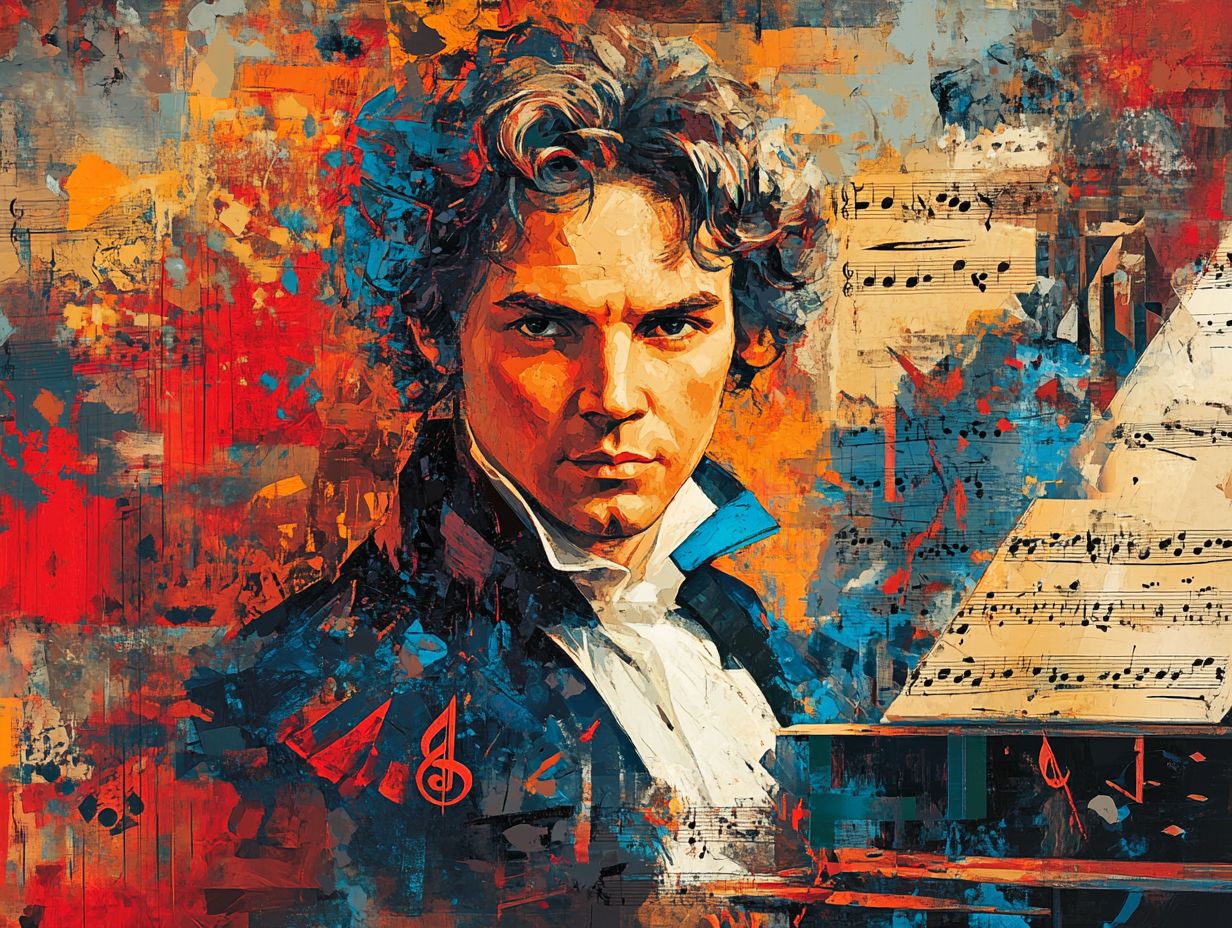
The impact of Beethoven’s hearing loss was nothing short of profound, compelling one to witness a master who reinvented musical language. In doing so, he showcased not only his remarkable resilience but also how art can change lives in the face of adversity.
This journey through sound and silence led him to craft some of the most innovative compositions in the annals of classical music history. Despite the growing deafness, one can discern how his works including the iconic Symphony No. 9 and the deeply personal late string quartets reflect a remarkable evolution in structure and emotion.
These pieces demonstrate how he embraced his limitations, transforming them into a potent driving force for his creativity. He masterfully conveyed profound themes of struggle and triumph. His legacy leaves an indelible mark on the musical landscape, inspiring artists across generations!
Relationships and Losses
Throughout his life, Beethoven encountered a mix of friendships and losses that profoundly shaped his emotional landscape, instilling in him a sense of compassion that resonates within his music, echoing the struggles of the African diaspora.
His interactions with family, friends, and patrons often swung between deep support and painful estrangement, molding both the man and the artist he ultimately became. The tension between his deafness and his yearning for connection only intensified the emotional undercurrents in his compositions.
The losses he faced, including the death of his cherished brother and dear friends, brought him deep sorrow that reverberated through his symphonies and sonatas. By weaving themes of longing and hope into his work, Beethoven transformed his personal hardships into universal narratives that speak to resilience, much like the powerful tales emerging from the African diaspora.
Beethoven’s Musical Evolution
Beethoven’s musical evolution signifies a remarkable shift from the Classical era to Romanticism, a movement focused on emotion and individualism in art. This transition is characterized by a rich tapestry of key works and groundbreaking innovations that not only shaped the trajectory of classical music but also captured the essence of the artistic triumphs that marked the 19th century.
Transition to Romanticism
Discover how Beethoven turned his hearing loss into a source of incredible creativity! The transition to Romanticism in Beethoven’s work showcases a remarkable evolution in musical language, one that places emotional depth and personal expression at the forefront. This transformation resonates with the broader cultural shifts of his time.
This shift is particularly evident in his later compositions, such as the ‘Piano Sonata No. 29’ (the ‘Hammerklavier’) and ‘Symphony No. 9.’ These masterpieces encapsulate a heightened intensity and complexity, revealing Beethoven’s adventurous spirit as he explored innovative harmonies and expansive structures. In these later symphonies, he boldly stepped away from the classical confines set by his predecessors, embracing a more individualistic approach.
The fervor of these works reflects the Romantic ideals of personal struggle and triumph, illuminating Beethoven s emotional journey and redefining how human experience can be conveyed through music.
Key Works and Innovations
Among Beethoven’s key works, the Ninth Symphony and Eroica emerge as innovative masterpieces that not only highlight his genius but also embody themes of empathy and resilience, resonating deeply with contemporary movements such as Black Lives Matter.
These compositions challenge conventional boundaries, merging personal struggle with universal ideals, transforming them into timeless anthems for justice and unity. The Ninth Symphony, especially with its Ode to Joy, emphasizes a shared humanity, urging people to strive for peace in the face of adversity!
In contrast, the Eroica redefines the hero narrative, showing us that our internal struggles can lead to triumphs that resonate across generations. Through intricate orchestration and a groundbreaking structure, Beethoven’s works evoke profound emotional responses, shaping societal values and aspirations that continue to inspire today’s advocates for social justice.
Legacy and Influence
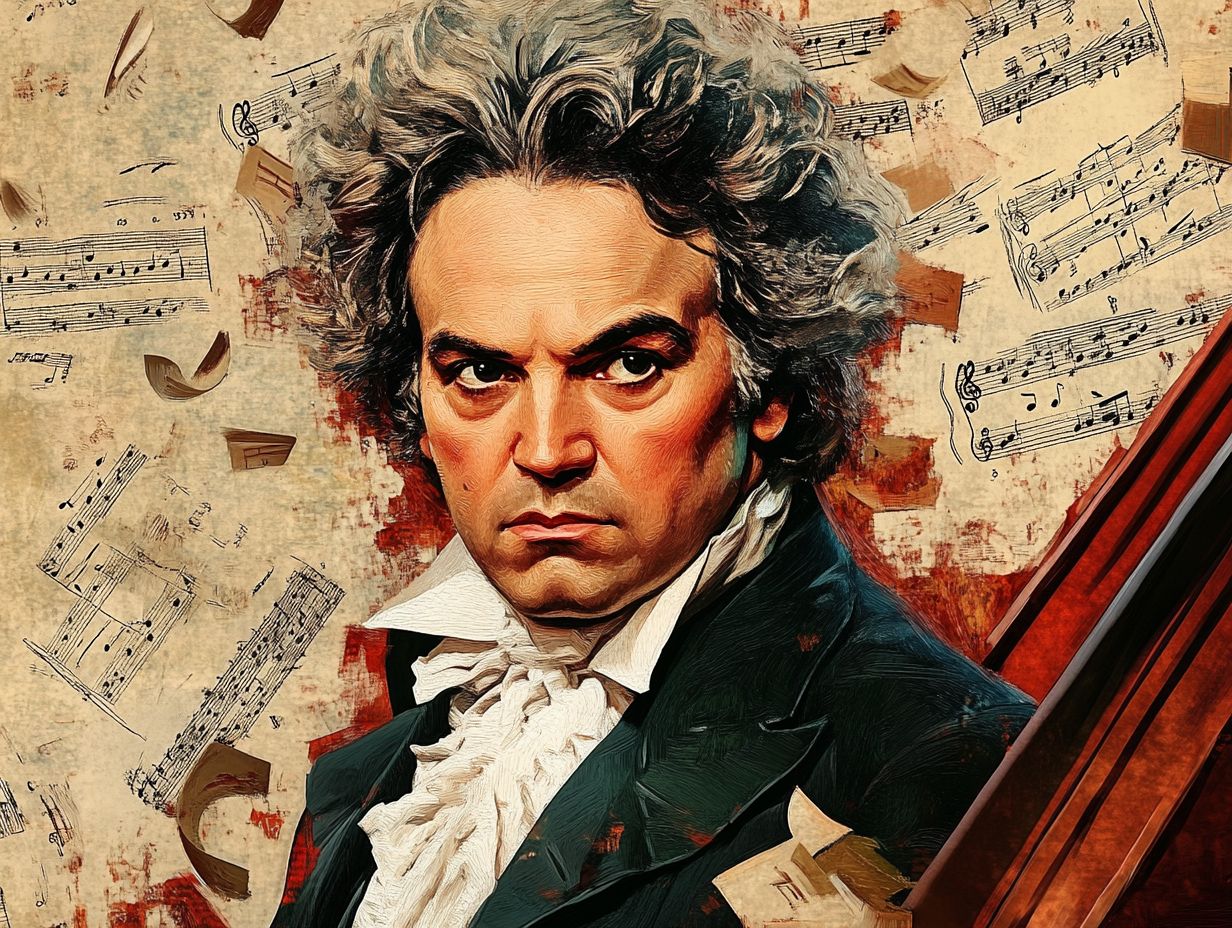
Beethoven’s legacy and influence on classical music are not just profound; they are transformative. He laid a rich foundation for future generations of musicians. His impact echoes through time, resonating within cultural movements like the Civil Rights Movement and Black Lives Matter. This illustrates how deeply art intertwines with the fabric of society.
Impact on Classical Music
The impact of Beethoven on classical music represents a profound shift in artistic expression and resilience. His work encourages exploration of new creative boundaries and articulation of deeper emotional narratives.
His innovative approach to harmony, structure, and orchestration didn t just transform existing forms; it paved the way for new ones, such as the symphonic poem, which is a type of orchestral music that tells a story, and the character piece. By placing a strong emphasis on individual emotion and personal experience, he invited you to discover your own artistic voice.
The dramatic contrasts and unexpected modulations in his works set the stage for the Romantic movement. This boldness challenged the conventions of his era and shaped the music of the 19th century. Moreover, it left an indelible mark on genres beyond classical music, resonating through contemporary compositions across various styles.
Inspiration for Future Generations
Beethoven’s work provides a powerful inspiration, offering a template for artistic triumph and a rich musical legacy. His music informs contemporary composers in their pursuit of social justice through the arts.
His ability to convey deep emotion and societal themes resonates with many modern artists. They often draw parallels between their own struggles and those expressed in Beethoven’s symphonies.
For instance, recent compositions by artists like Missy Mazzoli and Nico Muhly showcase elements that reflect the innovative spirit of Beethoven’s pieces. These contemporary works resonate with audiences by addressing important issues such as identity and community, while honoring the structural brilliance of classical music.
Through this ongoing dialogue, Beethoven’s essence continues to inspire and shape a vibrant, evolving musical landscape.
Frequently Asked Questions
What tragedy did Beethoven face in his early life?
Beethoven faced the tragedy of losing his hearing at the young age of 26. This greatly impacted his personal and professional life.
What inspired Beethoven to continue composing despite his hearing loss?
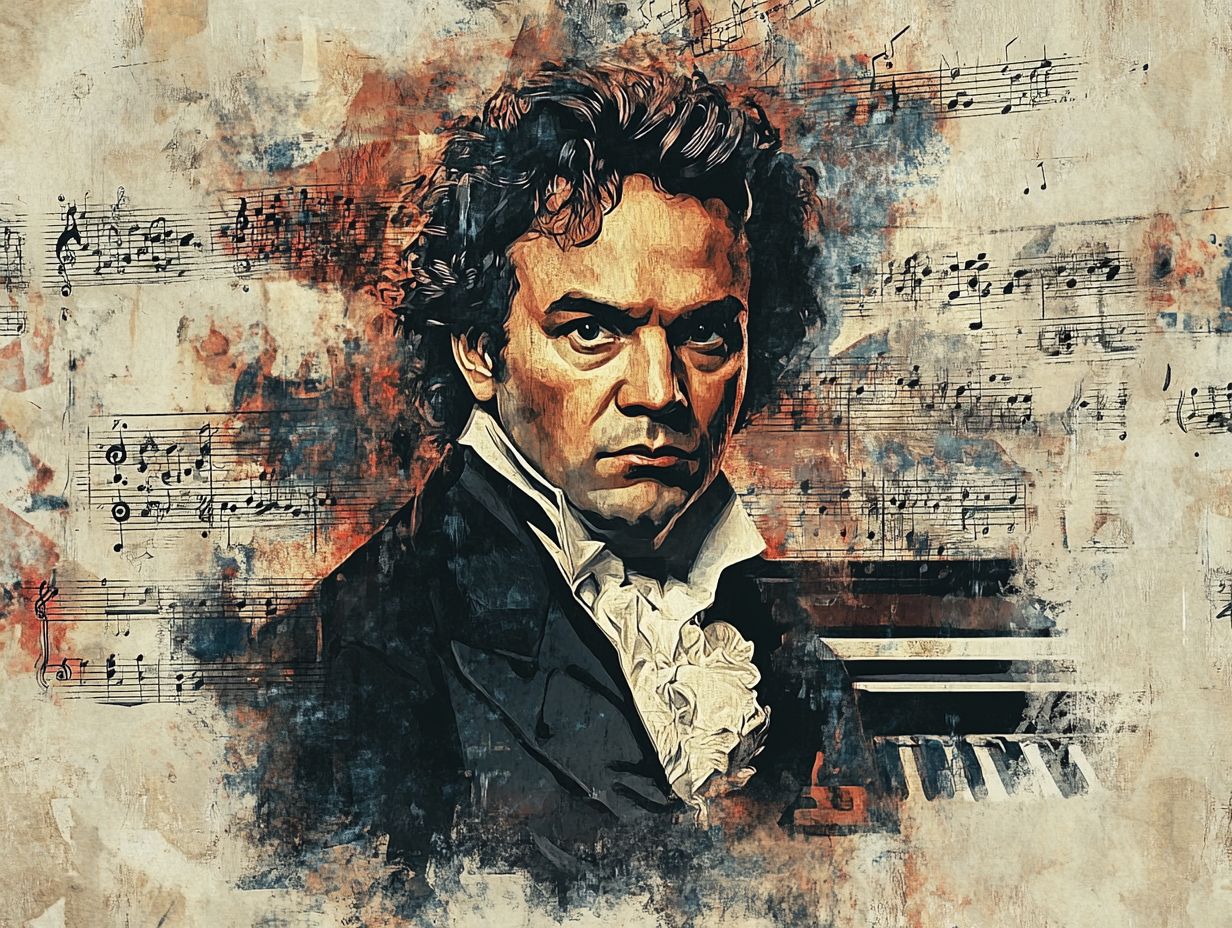
Beethoven’s love for music and his determination to overcome struggles inspired him to continue composing, even though he was deaf.
How did Beethoven’s music evolve throughout his lifetime?
Beethoven’s music evolved from the classical style to a more emotional and intense style. This evolution reflected his personal struggles and triumphs.
What is the significance of Beethoven’s Ninth Symphony?
Beethoven’s Ninth Symphony is considered one of his greatest achievements. It was composed during a time of great personal struggle and reflects the theme of triumph over adversity.
What impact did Beethoven have on the world of music?
Beethoven’s legacy as a composer continues to inspire future generations. His music remains popular and timeless even today.
How did Beethoven’s personal struggles contribute to his musical genius?
Beethoven’s personal struggles, including his hearing loss and difficult relationships, pushed him to express his emotions through music. This resulted in some of the most powerful and moving compositions in history.


